How Violent Mobs Are Threatening Free Speech
PAGE 5
When A Teacher Voiced Concerns About A Library Book
PAGE 19
Debanking: Cancel Culture’s Newest Threat
PAGE 21

How Violent Mobs Are Threatening Free Speech
PAGE 5
When A Teacher Voiced Concerns About A Library Book
PAGE 19
Debanking: Cancel Culture’s Newest Threat
PAGE 21
Government Officials Direct A Christian School To Choose Between Faith And Food


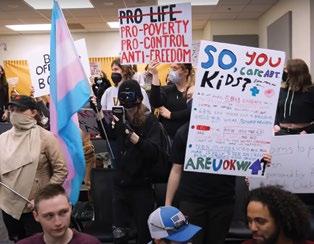
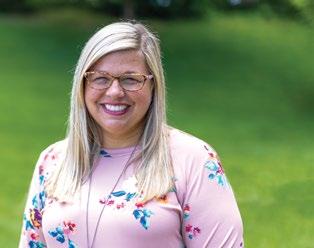

My husband, Ben, and I promised each of our kids that our family would go on a trip of their choice when they graduate high school. Our daughter, Grace, chose Israel.
We made that trip earlier this year. Being there — walking in the very footsteps of Christ and His disciples — deepened our love for and understanding of the Bible. It was an experience our family will never forget.
On the heels of that trip, I continued east to visit our ADF team in India and had the honor of walking with the faithful there.
Christians face stiffening headwinds in India. The constitution there officially protects religious freedom, but believers increasingly face beatings, harassment, and even prison for their faith. Remarkably, some clients we met told me they were grateful for their time in prison because it allowed them to share the Gospel with other prisoners — and some came to Christ.
Those Indian Christians radiated a peace and joy that mirrored that of the apostles in the Book of Acts. The apostles faced their own beatings, imprisonment, and censorship. Yet they continued to speak boldly as the Spirit gave them strength. And they “rejoiced” that they were counted worthy to suffer for the name.
Like India, Western nations all have written guarantees of free speech and religious freedom, but judicial rulings have gutted those protections. America is now the last nation in the Western world still resisting “hate speech” laws. There’s a lesson here for us. Constitutional rights mean little on paper if they are not enforced by the government and upheld in the hearts of citizens.
One of the most important places to speak the truth today is in the classroom. And it is there that freedom is being hotly contested.
When a Florida Christian school was given the choice of compromising its beliefs or losing lunch money for its schoolchildren, the administrators refused to be held hostage. When a Georgia substitute teacher saw disturbing material being taught to elementary students, she spoke up. Both paid a price, but their courage paid off. You can read their stories in this edition of Faith & Justice .
Christians know the truth. What we need today is the courage to speak it. When I think of the extraordinary courage of Indian Christians or the faithful resolve of ADF clients to speak truth amid lies, I am amazed at how God has worked astonishing results — just as He did in first-century Israel.
I hope these stories encourage you. God can use each one of us to bear witness to the truth and keep the door open for the Gospel.
Thousands of miles from India, similar trends are afoot. “Hate speech” laws, which target whatever government officials regard as “wrongthink,” now blanket Europe, Australia, New Zealand, and Canada. Once-common understandings of gender, marriage, and sexuality are being censored. Dissent can land you in jail
Kristen Waggoner greets an ADF India attorney at the India office, wearing a mala (garland) that symbolizes welcome and appreciation to guests.
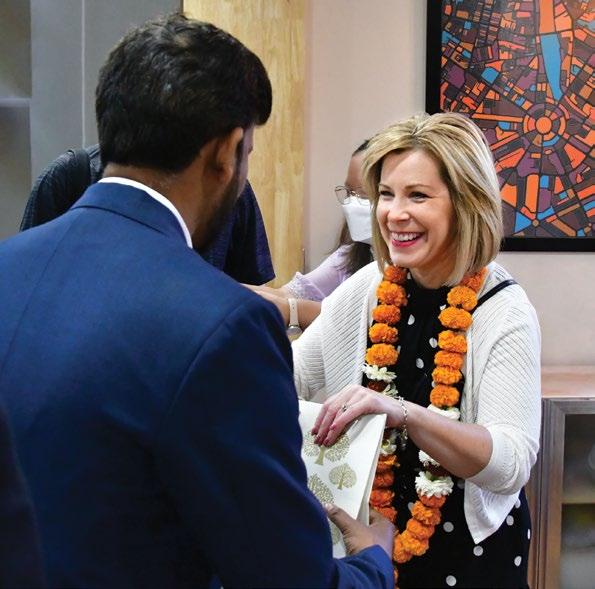
Christians know the truth. What we need today is the courage to speak it.
Kristen Waggoner

Resolving lawsuits brought by four churches, two federal courts in California have ruled that the First Amendment protects the churches’ right to exclude elective abortion coverage in their health insurance plans.
As revealed in emails discovered by ADF attorneys, the California Department of Managed Health Care issued its mandate in response to demands from Planned Parenthood. Those demands directed the agency to implement a “fix” requiring the health plans of religious organizations to include coverage for abortion — regardless of moral or conscientious objections and despite state recognition up to that point that religious groups shouldn’t be subject to such requirements.
The abortion giant threatened to promote its own legislative “solution” if the state didn’t act, so DMHC issued its mandate in 2014. ADF attorneys filed the two cases in 2015 and 2016. Following the courts’ rulings, the state agreed to pay $1.4 million toward the churches’ attorneys’ fees.
A single mother wishing to adopt two siblings from foster care has filed a federal lawsuit against Oregon state officials for denying her application because of her religious beliefs.
Jessica Bates applied to become certified to adopt children from Oregon’s foster care system in March 2022. Months into the process, the state denied her application because Jessica would not agree to the state’s policy requiring applicants to “support” the sexual orientation or gender identity of any child who could be placed in her home.

Under state policy, adoptive parents must agree to use a child’s preferred pronouns, take a child to events like Pride parades, or facilitate a child’s access to dangerous pharmaceutical interventions like puberty blockers and hormone shots. During her application process, Bates alerted state officials that she will happily love and accept any child, but she cannot say or do something that goes against her Christian faith.
Bates, who lost her husband in a car collision six years ago, is a mother of five children, ages 10 to 17. ADF is representing Bates in the case.
A middle school student and his family have filed a lawsuit against the Town of Middleborough and school officials for forbidding him to wear a T-shirt with the words “There are only two genders.”

Liam Morrison attends Nichols Middle School (NMS) in Middleborough, MA. In March, he wore the shirt to school one day to share his belief that a person’s gender is inextricably tied to sex. The school’s principal
pulled him from class and ordered him to remove the shirt, telling him he could not return to class if he did not comply. After he politely declined, his father picked him up from school.
The school dress code policy permits students to wear clothing conveying a multitude of messages, but NMS interpreted the dress code to disqualify speech it does not like. Liam’s shirt had caused no disruptions when school officials demanded he remove it.
ADF is representing Liam to protect students’ free speech.
Center for Academic FreedomThis isn’t about a T-shirt. This is about a public school telling a seventh grader that he isn’t allowed to hold a view that differs from the school’s preferred orthodoxy.
Tyson Langhofer, Director ADF
ADF Allied Attorney Brad Blake successfully protected the right of a Christian to freely pray on the grounds of the Missouri State Capitol and Supreme Court.
The state told Blake’s client that he could pray on the grounds of the two civic buildings only if he did so silently and in a way that was not evident to others, prohibiting even kneeling in prayer. Blake then sent a letter to the state protesting the unconstitutional directives.
The victory in Missouri offers stark contrast to recent events in the United Kingdom, where a new law bans “influence” of any kind, including prayer, within 150 meters of any abortion facility nationwide. In the past year, two individuals have been charged and one fined for engaging in silent prayer in front of abortion facilities in England and Wales.
After receiving the letter, the state withdrew its prohibitions, allowing Brad’s client, and others, to pray freely and openly at the Capitol and Supreme Court.
Felipe and Carolina Widow filed a lawsuit with the Chilean Court of Appeals on behalf of their son Jose – the oldest of 10 children – after the government refused to recognize the high school diploma he received from an accrediting institution in Texas. The Ministry of Education argued that because Jose had never actually studied abroad, he was not eligible for a diploma issued outside the country. Without a legally recognized diploma, he does not have the opportunity to enroll in a Chilean university.
“The Ministry is using the circumstance of Jose’s physical location to refuse to recognize the validity of his homeschool education,” says
Tomás Henríquez, director of advocacy, Latin America & Caribbean for ADF International. “This amounts to a violation of the rights to equal protection and educational freedom under the Chilean constitution.”
Carlos and Ana María Lind, another Chilean couple working with the Texas accrediting institution, also filed a lawsuit to defend their rights as they homeschool their three children.

ADF International is serving as co-counsel in the two cases.

An Iranian Christian pastor has been released from prison after nearly five years in detention.
Yousef Nadarkhani, leader of a 400-member house church, was arrested in 2018 on charges of acting against national security and promoting “Zionist Christianity.” At the time of his arrest, police raided Nadarkhani’s home and physically attacked him and his son before taking the pastor to a prison in Tehran.

Iran has long held a spot on the U.S. State Department’s Country of Particular Concern watchlist for its systematic and egregious religious freedom violations. While over 500,000 Christians and thousands of other Iranian citizens identify as religious minorities, the Iranian constitution holds Islam as the official state religion. The penal code specifies the death penalty for attempts to convert Muslims away from Islam.
ADF International had advocated for Nadarkhani’s release since 2019.
We are thankful that Pastor Nadarkhani was finally released from prison, but the situation facing Christians and other religious minorities in Iran remains dire.
Kelsey Zorzi, Director of Advocacy for Global Religious Freedom, ADF InternationalYousef Nadarkhani

OOn March 29, Kristan Hawkins, president of Students for Life of America (SFLA), stepped onto the campus of Virginia Commonwealth University (VCU) to deliver a speech as part of her “Lies Pro-Choicers Believe” tour. It turned out to be quite a step. Hawkins had been invited by the VCU chapter of SFLA, which followed all the protocols for bringing a speaker to campus. Hawkins is no stranger to the oppressive climate on many of America’s college campuses; she’s been speaking about her pro-life stance for years. But the experience that awaited her at VCU was not merely oppressive. Hawkins was about to walk into what has become the newest threat to freedom of speech: mob violence.
Left-wing protesters, many of whom carried signs identifying themselves as “Antifa,” disrupted the event by blocking doors and shouting obscenities and slurs at Hawkins and her co-host, Turning Point USA contributor Isabel Brown. The vulgar shouting quickly devolved into violence as the mob began destroying audiovisual equipment and assaulting numerous pro-life students and SFLA staff. EMTs were called to the scene to treat injuries.
Kristan HawkinsThe SFLA group had contacted VCU prior to the event to express concern about the potential for disruption, but the university did not provide sufficient protection.
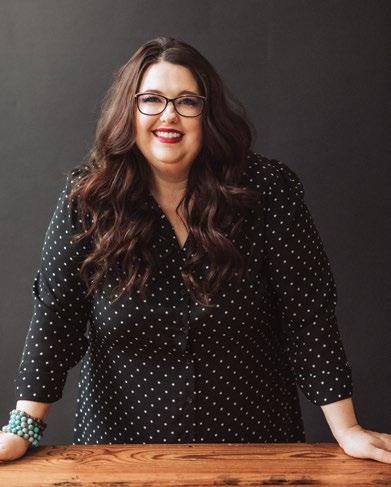
Campus security personnel stood by, outside the room, but took no action until the protest turned violent. When police arrived, officers escorted the pro-life speakers and students from the room instead of forcing the mob to leave.
“Free speech has been under attack on campuses for a long time,” says Tyson Langhofer, director of the Alliance Defending Freedom Center for Academic Freedom, “but this violence against conservative speakers and students is absolutely something new.”
Up until the last few years, Langhofer says, conservative groups struggled mostly against unfair policies, often receiving fewer student funds than other campus clubs and struggling to be formally recognized by their universities. Now, however, conservative speakers on both public and private campuses regularly face a gauntlet of violent, vulgar protesters — and administrations rarely lift a finger to enforce their own rules for student behavior.
Langhofer connects this to a rise in critical theory, a radical ideology that denies objective truth and instead views everything in terms of power and oppression. “Once there’s no such thing as truth,” he says, “and once one side is deemed an oppressor, even giving someone a platform becomes a form of violence. And it becomes justified to use violence to stop it.”

Anti-freedom protesters often use violence to silence speech on hot-button cultural issues — abortion, sexuality, religious freedom — but no topic is safe.
In 2019, an Antifa group shouted down economist Arthur Laffer, a former Reagan administration official, who was scheduled to speak at the State University of New York at Binghamton. Campus police allowed the mob’s shouting to continue for nearly two minutes — at one point, ironically chanting “free speech” — before they shut down the event and ordered Laffer’s security to remove him from his own lecture.
No amount of expertise protects a speaker. Laffer had recently been awarded the Presidential Medal of
Freedom, but Antifa protesters still made it impossible for him to speak.
Protesters justify such behavior through Orwellian doublespeak, Langhofer says: they claim “oppressive” speech — even peaceful speech, like Hawkins’ and Laffer’s — is a form of violence, which justifies using actual violence to stop it. But conflating peaceful speech with violence raises dangerous implications.
“We have two options,” Langhofer says. “We can change society through the spoken word or through violence. But once you say ‘speech is violence’ … you only have violence.”
SFLA reports that in the 202223 school year, vandalism at its campus events grew 65% from 2021-22; bullying went up 300%; other threats to free speech were up 400%. SFLA filed one lawsuit on free speech issues in 2021-22; in 2022-23, it filed five.
Those numbers represent the challenges faced by other conservative groups and speakers on campuses right now, including ADF. As a result, the ADF media team has developed new strategies for preparing the ministry’s attorneys and allies for speaking in hostile environments.
While ADF media training once focused exclusively on making clear arguments, James Arnold, ADF director of communications integrity, says the team now spends more time on how to respond to mobs.
“A mob doesn’t want you to speak,” Arnold says. “They want to trick speakers into reacting badly.” To prepare for that, he says, media training now includes having several ADF team members on hand to hold up signs, interrupt trainees, and generally prepare them to respond graciously to rude or even hostile behavior.
ADF is now preparing speakers to be aware of security and mindful of demeanor, Arnold says, since they’re likely being recorded or even livestreamed. “Treat every sentence,” he tells speakers, “as if it’s the only sentence the world will hear.”
Administrators have created a monster. We have campuses full of young people who do not believe in truth and respond with violence.
Tyson Langhofer Director, ADF Center for Academic Freedom
Blame for the collapse of public discourse on campuses, Langhofer says, falls squarely on university administrations. Many universities have hired “Diversity, Equity, and Inclusion” (DEI) administrators, giving them unlimited power over university polices, student group funding — and potentially controversial student-group events.
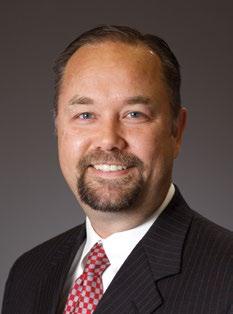
“These DEI administrators apply critical theory to every part of campus life,” Langhofer says, from monitoring dormitory bulletin boards for “problematic” events to encouraging students to snitch on each other for so-called “microoffenses.”
What DEI administrators won’t admit, he says, is that their constant power-brokering between

groups can often lead to real violence. When it does, these DEI administrators are reluctant to push back, clearly terrified of the beast they’ve unleashed.
Langhofer witnessed this himself during a recent event at Loyola University. He was invited to debate the associate dean of mission innovation about DEI initiatives, but protesters infiltrated the room, screaming too loudly for him to be heard. The associate dean tried to speak — to her own students — about the importance of free speech, but the students continued shouting. She timidly suggested to one particularly disruptive young man that he might be violating the student code of conduct. “I don’t care,” he retorted.
Eventually, the protesters left the room, and the debate went on. But there was little to discuss once it became clear the students didn’t believe in objective truth. Some said as much. Instead, they said, they trust personal experience.
The associate dean encouraged this trust. One student asked if
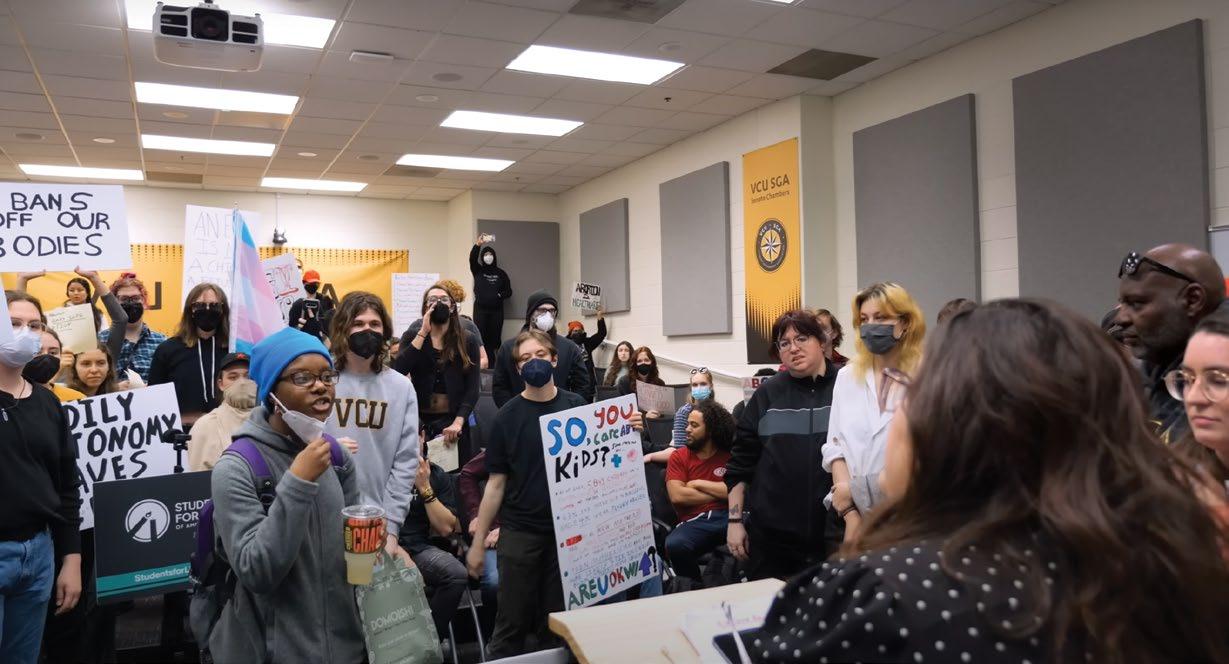
Free speech has been under attack on campuses for a long time, but this violence against conservative speakers and students is absolutely something new.
‘‘
Tyson Langhofer Director, ADF Center for Academic FreedomKristan Hawkins attempts to speak over the shouts of protesters at Virginia Commonwealth University. Students for Life of America photo
believing the world is flat makes it so. “It does [mean that] for you,” the associate dean said. In response, Langhofer contended that personal experience can never overturn reality. But his was a lone voice for that perspective.
“Administrators have created a monster,” he says. “We have campuses full of young people who do not believe in truth and respond with violence to all authority figures, to any structures designed to facilitate free speech, and to all efforts to curb vulgar and immature behavior.”

It doesn’t have to be this way, he says. In the few instances where university administrators have enforced the rules and issued consequences for violent behavior, the violence has quickly ceased.

After Kristan Hawkins was shouted down by violent protesters at VCU, ADF sent a letter to the university, accusing it of violating Hawkins’ constitutional right to free speech and advising administrators to invite her back to speak with proper protections in place.
The university followed that advice. Administrators allowed SFLA to host another event featuring Hawkins, this time with adequate security on hand. Protesters showed up again, but this time police arrested four people. The disrupters disappeared, the event continued, and students interested in having a genuine discussion with Hawkins were able to do so.
The solution to campus violence is simple, Langhofer says: administrators must simply and fairly enforce the laws and policies that are already in place.
“If colleges and universities begin right now to protect free speech regardless of viewpoint and to punish violent protesters, problems will be easy to address,” he says. “But if officials allow students to make violence a habitual response to disagreement, the entire public square could soon be dominated by the violence now seen on campuses.”

ADF’s Center for Academic Freedom is on the front line of this work. Alongside allies like SFLA and Young Americans for Freedom, the ministry is working to equip student groups to bring speakers to their schools, navigate violent responses, and work for justice in the aftermath. ADF is also reaching out to administrators and encouraging them to prepare to stop violence on their campuses.
“Freedom is a great inheritance, and right now it is imperative that we protect that inheritance,” Langhofer says. Across the nation, he says, young people are being indoctrinated to believe that freedom is inherently violent, and universities are allowing them to bring violence against free speech with impunity.
“The good news is that by upholding the rule of law, we have a chance to come back from the brink,” he says. “If we do not, we must prepare to live in a world where many people believe that the only road to change is violence.”
VISIT Centerforacademicfreedom.org
to learn more about how ADF is protecting free speech on university campuses
If officials allow students to make violence a habitual response to disagreement, the entire public square could soon be dominated by the violence now seen on campuses.
Tyson Langhofer, Director ADF Center for Academic Freedom
Their ideology has literally gotten to the point that they want to take food away from hungry children, if a school won’t sign off on the administration’s view of sex and gender.
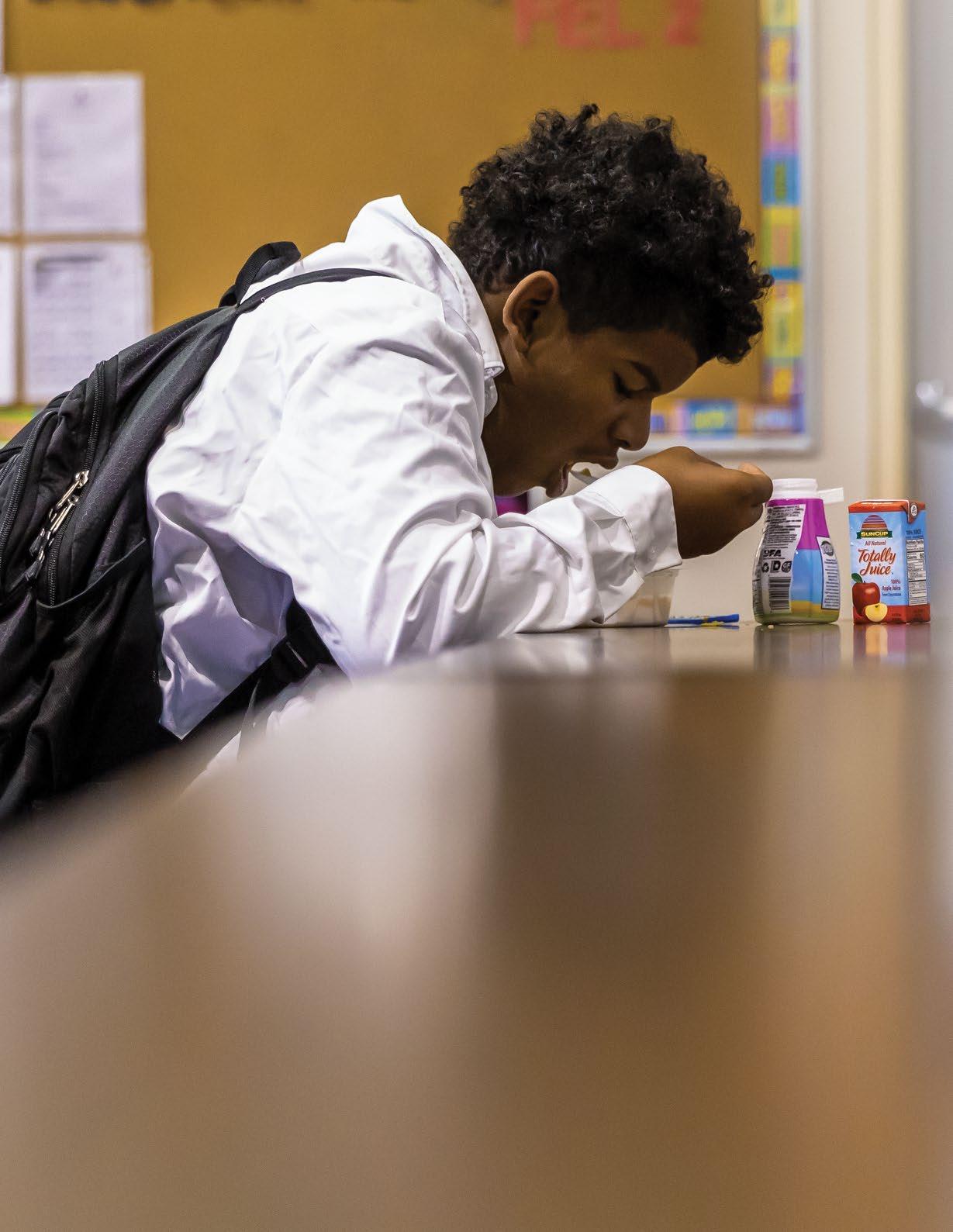 Julie Blake, ADF Senior Counsel
Julie Blake, ADF Senior Counsel
 By Chris Potts
By Chris Potts
It’s breakfast time at Grant Park Christian Academy. Children filter in from all corners of the one-mile-square, low-income neighborhood in East Tampa, Florida. Some scamper in alone, some with a friend. Not a few are escorted more quietly by their moms — mostly single women, grateful for somewhere to leave their children during the long day’s work ahead. Two vanloads of children will soon swell the ranks, shepherded in by the principal, who’s driving one of the vans today.
The students wear clean white shirts, crisply ironed; many have on ties. Nearly everyone shoulders a colorful backpack. Most of the children smile shyly and murmur a polite “hello” as they move toward the neat array of food trays by the kitchen.

On the trays this morning are Frosted Flakes, apple slices, and juice boxes. The children sweep them up and quickly diverge into small, gossipy groups — boys at one line of tables, girls at the other. They eat happily, prying out each other’s secrets and boldly proclaiming news of the day. They giggle and whisper, stealing frequent, furtive glances at the gigglers and whisperers at the table across the way.
After a while, five students — representing each of the school’s three grade groups (K-2, 3-5, 6-8) — make their way to the little stage at one side of the room, patiently awaiting the principal’s booming call for quiet and his signal for them to lead the morning pledges: first, to the Christian flag, then the Stars and Stripes, then the Bible. After that, one child leads the Lord’s Prayer, followed by another offering a more personal intercession.
It’s Wednesday, so music is on the program: some praise songs, distinguished more by enthusiastic clapping than strong singing. The principal, noting this, prods the 60-or-so boys and girls before him to better warbling.
“On this next one,” he says, “lift your voice and give God the best you can.”
They oblige, loud and sweet. Giving “God the best you can” is an idea that’s been modeled well for all of them, in their time at this academy. It’s a commitment that has shielded them from some of the worst things others would have inflicted on them.
Pastor Alfred Johnson didn’t have a dream, but he knew some men who did.
What Alfred — who lived in the Grant Park community as a child — did have was a hole in his heart where his enthusiasm used to be. After pastoring one church with considerable success for most of 20 years, he one day found himself longing for something else.
“My soul isn’t happy,” he told family and friends. “Something isn’t right.”

Then, in the space of a few short days, two different deacons came to him, describing a dream each had had about him. Neither had shared their vision with the other, but Alfred marveled to find the dreams eerily similar. Both involved him sitting at a long table, circled by other church leaders. In one, the table suddenly broke in half. In the other, a voice directed that Alfred be presented with a double portion of what was given to the rest.
The meaning was clear enough, as far as Alfred was concerned. His days as a full-time pastor were coming to an end. And his work as a community outreach leader was about to begin.
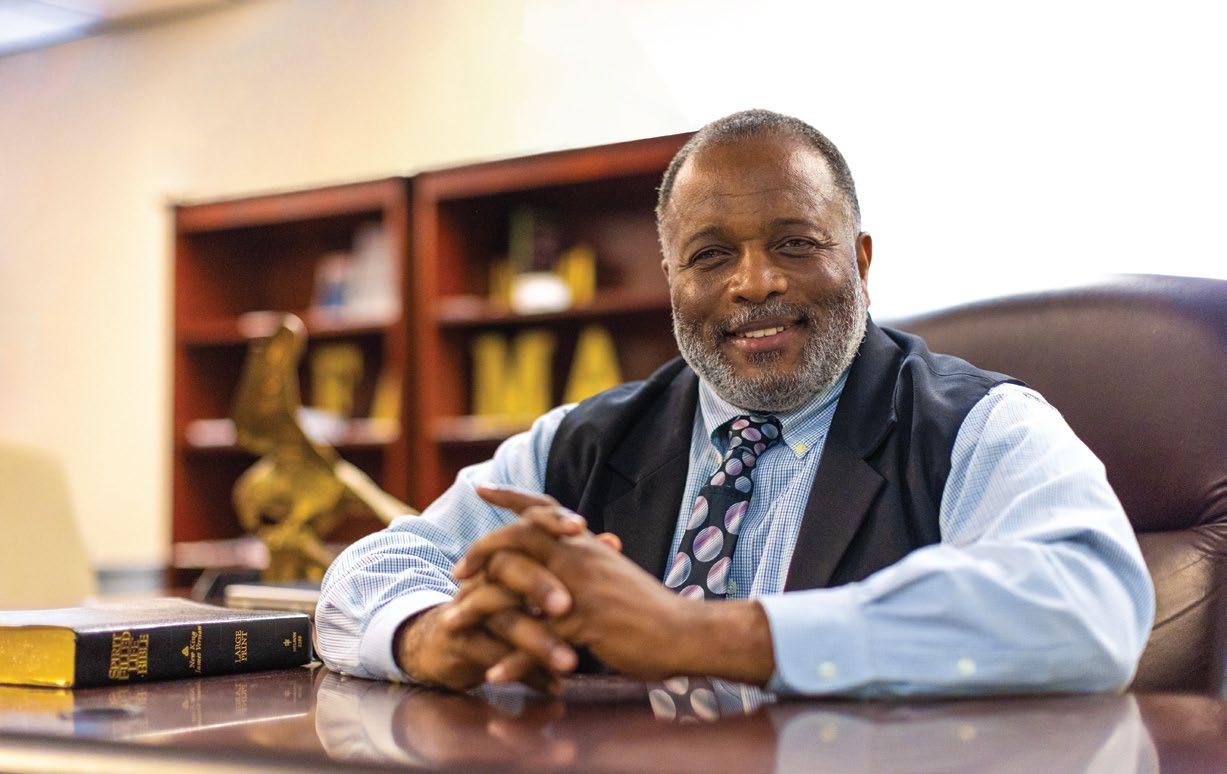
Vividly aware of the problems plaguing the lowincome neighborhoods around him, he formed the Faith Action Ministry Alliance (FAMA), whose mission he describes as bringing together “believers from for-profits, not-for-profits, churches, and Christian heads of households to coordinate services that bring neighborhood uplift.” FAMA does its lifting via health fairs, youth recreation programs, real estate assistance, financial planning courses, community meetings — and Grant Park Christian Academy.
Alfred and his wife, Donna, had canvassed the families of the impoverished community well enough to know how much the predominantly single parents wanted a better learning environment for their children. Too many youngsters in that area, Alfred says, were coping with the stress in their life by “hollering and fighting” — a tough combination for public schoolteachers and administrators, since “they can’t exercise firm boundaries, and they can’t pray for the children.”
Grant Park Christian Academy would offer an alternative. With a nonprofit organization, “Step Up for Students,” providing full scholarships, and a church providing the building, Alfred soon had all the children his small, mostly volunteer staff could handle, and a waiting list that just keeps growing. Parents loved the small classes, strong discipline, and committed teachers. And one more thing: the food.
We’ve had kids who’ve been kicked out of other schools, even multiple other schools. They come here and experience just the love, the embrace. It’s changing their lives.
Alfred Johnson, Founder and CEO Faith Action Ministry AlliancePastor Alfred Johnson
Early on, when the academy first opened, Alfred was astonished at how many of the children came to school with nothing for lunch. Or, in some cases, something worse than nothing.
“You’d see parents bringing Twinkies,” he remembers. “One lady brought two hot dogs. Two … to split between four kids. I don’t mean two fully made hot dogs. She sent them with just the franks.” Another mom sent her child each day with a Little Debbie cake and a bag of chips.
Alfred knew many of the families were on food stamps and genuinely hard-pressed for money, but “there’s no way I could have these kids eating that junk.” Nor was he willing to dismiss students who couldn’t really concentrate with growling stomachs.

So, soon after the academy launched, Alfred and his staff worked to secure the school’s participation in the federal government’s national school lunch program (administered by the Florida Department of Agriculture), which offers funding for nutritious breakfasts, lunches, and snacks. The additional funding proved a big help — and became even bigger, as the school’s enrollment grew.
Alfred then turned to the person he knew was most capable of creating nutritious meals on a meager budget: his wife.
“She’s into nutrition,” Alfred says, a little woefully. “We haven’t had regular milk in our refrigerator for
years. I eat uncured turkey bacon. No pork. No white bread. No sugar.” Donna harbors a particular passion for organic fruit and vegetables — and if that kind of diet was good for the prophet Daniel, Alfred decided, it’s good enough for the children of Grant Park.
Donna made the academy’s kitchen her own, stretching the school’s $10,000-a-month food budget with trips to farmers markets, buying in bulk. “Big boxes of organic bananas,” Alfred says. “You’d be amazed. Those kids want those bananas.”


“They’re banana crazy!” Donna laughs. “We do banana breakfast, banana lunch, and banana snacks. But if they get some bananas in them, that’s good nutrition. I try to get them as much as I can.” The bananas and other fruits and vegetables quickly made a vivid difference in the children’s vitality. Donna even started a garden on a stretch of yard by the school’s playground, teaching the students how to grow good food to supplement what the school can afford.
“There’s something about nutrition that draws these kids,” Alfred says. With full bellies and balanced diets, “the kids are able to focus in class. We’re now able to prepare meals that are at least reaching a minimum threshold of good nutrition.”
Unfortunately, the federal funding for those meals left the school vulnerable to a threat Alfred and his team could hardly have imagined.
What Alfred found he needed most, in the early years at Grant Park, was a gifted principal who could share his vision for the school and its community. He found him one day when he made his monthly trip to preach in a church for the homeless. Another church stood next door, and something about it stirred Alfred’s curiosity. He decided to visit it on his next free Sunday.
There he met Pastor Terrence Fleming, who shepherded his church in between day work as a high school administrator, evening work in real estate, and fulltime duty as a father of seven. Other than that, his time was his own. One day, he stopped by the school to visit with Alfred for a little while, before a dentist appointment.
Later, coming out of that appointment, he felt led by the Spirit of the Lord to give Alfred a call. “Pastor Johnson,” he said, “did you have something you wanted to ask me?”
Alfred offered him a job he could sink his teeth into.
“It’s a school,” Terrence says, “but it’s also a ministry.” Ministry means driving the school van on days when no one else is available, and giving his students rides when he sees them walking through
rough parts of the neighborhood. Evenings on the phone, talking with parents to learn more of the children’s home environment and ways he and others might help. All that on top of serving as principal, teaching upperdivision classes, and mentoring students in things at least as important as geometry and geography.
“We’re in a community that deals with a high level of poverty,” Terrence says. “There’s a certain mindset that accompanies that. But we don’t allow anyone to be a victim here. We teach our kids that, regardless of whatever circumstance they come from, with faith in God, hard work, good morals, good discipline, honor, and respect, they’ll be able to achieve whatever it is they desire. And there is no [one] holding them down.”
“You can’t have it both ways,” Terrence tells his students. “Either you can do all things through Christ who strengthens you — or you can’t. You trust God, you work hard, and you can determine your level of success. If you do what God says, God is going to do what He says.”
Children at Grant Park learn love for their country and respect for law enforcement. They’re taught that God

You can’t have it both ways. Either you can do all things through Christ who strengthens you — or you can’t.
Terrence Fleming, Principal Grant Park Christian AcademyPrincipal Terrence Fleming believes in teaching Christian character, as well as more scholastic elements of the Grant Park curriculum.
is the author of life and that every life is precious to Him. That God’s plan for marriage is one man and one woman, for life. Terrence and his team even take them out into the neighborhoods, once a quarter, to pick up trash and help older people in the community with difficult chores and small repairs.
“We want to help the neighbors see,” he says, “that we have a sense of pride and respect for this community.”
The neighbors have noticed.
“I knew we were going to have an impact, but this …,” Alfred says. “We’ve had kids who’ve been kicked out of other schools, even multiple other schools. They come here and experience just the love, the embrace. It’s changing their lives.
“Our ultimate goal here, of course, is to raise good Christians,” he says. “But good citizens, too. People who are able to get along with other people — manners, all of that — so that they’re not a danger to society. They’re a benefit to society. The children in our school are not going to be a threat to your family or mine.”
“We have a great relationship with law enforcement,” Terrence says. “They’ve seen a turn in what’s going on in the community. They can tell the kids who attend Grant Park Christian Academy versus the students who are in a public school, based off their manners and behavior.
“We have parents that don’t even have kids at this school, but they speak well of it,” he says.
At one community meeting, a mother spoke up. “My children have been in the school now for many years, and they’ve learned so much,” she said. “Their behavior and everything is just so different.
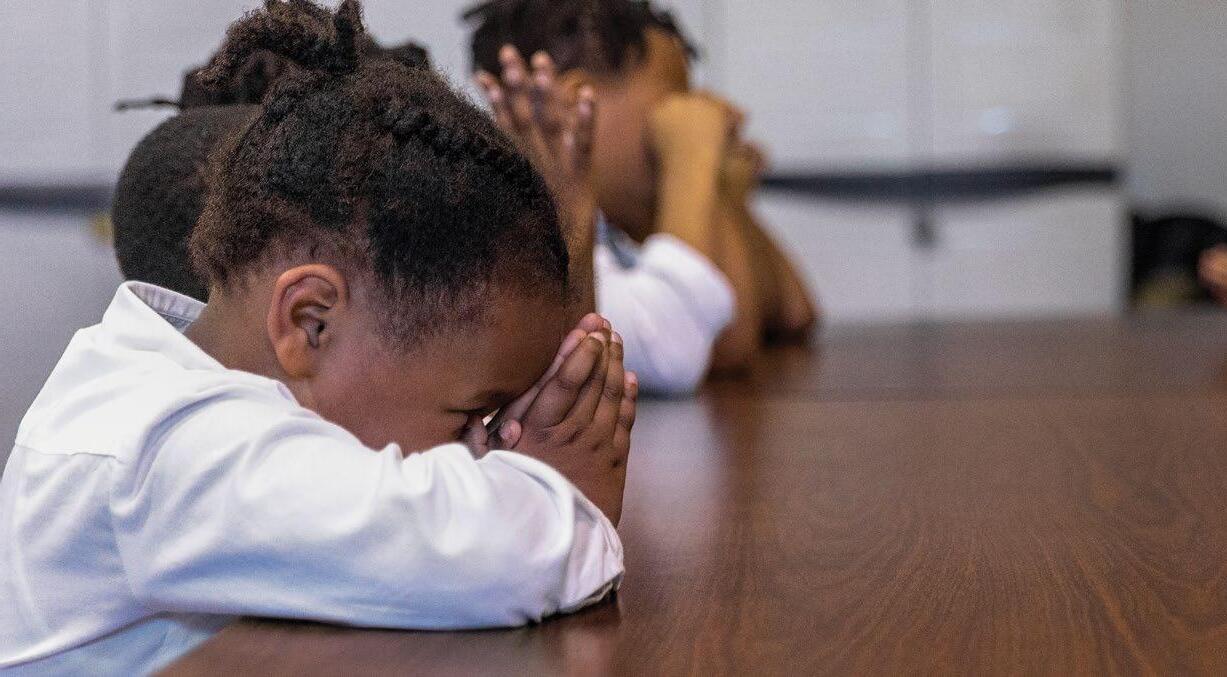
“I’m not much of a Bible person or anything,” she said, “but my children are learning it in this school — and they’re bringing it home. And …” Tears came to her eyes. “It’s changing our family.”
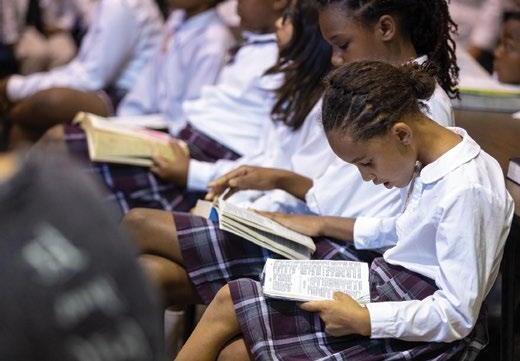
“Just to watch these kids be kids is quite rewarding,” Alfred says. “We have middle schoolers here that, if they weren’t here, the mess they would be in is just unbelievable. Here, they’re able to be kids.
“This generation is being introduced to so much stuff that’s aging them too quickly, from the internet to everything else. We can’t stop all of that. But there’s some guidance and a shield that we’re able to give them while they’re here that allows them to just be kids. I’m happy to see that.”
Our ultimate goal here, of course, is to raise good Christians — but good citizens, too. The children in our school are not going to be a threat to your family or mine.
Alfred Johnson, Founder and CEO Faith Action Ministry Alliance
The shield came startlingly into play one day last summer when, sorting through some accumulated email, Alfred opened a note from the Florida Department of Agriculture. It was a new U.S. Department of Agriculture (USDA) directive ordering all schools to implement Biden administration changes to Title IX
The note offered a blunt ultimatum: Grant Park could join the administration in embracing its view of sex and gender — requiring pronouns, adjusting hiring practices and dress codes, letting boys identify as girls and use the girls’ bathroom facilities, etc. — or the school would forfeit all federal funding.
Including the lunch program. No more breakfasts, no more lunches, no more snacks.
In effect, government officials were saying, Grant Park could go “woke” or its children could go hungry.


“I read that,” Alfred remembers, “and said, ‘You have got to be kidding me.’” He immediately called an emergency meeting of the school’s board of trustees, who agreed unanimously to “divorce from the government” and reject the directive. All agreed they would rather close the school than give in to the Biden administration’s demands. “We weren’t about to make that kind of moral compromise … allow them to dominate our faith over food.”
Alfred pledged to find another way to feed the children of Grant Park Christian Academy — but realistically, he knew how hard that was going to be. The people of his community couldn’t come up with $10,000 a month, indefinitely, and that’s what it would cost to keep the current meals coming. Even if he could land some generous outside donors, “it still would’ve been very tight.”

One of the board members took his concerns over the situation back to his personal prayer circle. In that circle was a man named Harley Riedel — an attorney, and a supporter of Alliance Defending Freedom. Harley was more than willing to take on the case himself, but he suggested that ADF might be even better positioned to do so. He made a call.
Julie Marie Blake is senior counsel on the ADF Regulatory Practice legal team — the team charged, among other things, with keeping track of what the federal government is up to. Some legal threats are easy to see coming, she says; some aren’t. In truth, the USDA’s decision
We weren’t about to make that kind of moral compromise … allow them to dominate our faith over food.
Alfred Johnson, Founder and CEO, Faith Action Ministry Alliance
to force schools to accept — through Title IX — the Biden administration’s view of sexuality was not much of a shock.
“Title IX is something of a super statute, in that it applies to every federal agency,” Julie says. “It says that if any of your federal money from any federal program goes to some entity that has education aspects, Title IX applies, and you can’t have sex discrimination in any of your activities.” Which was fine, she says, back when the statute was applied consistently along those lines, and only prohibited discrimination based on sex.
But once the federal government began redefining sex discrimination to include gender identity, “that was bad news for every public, charter, and secular private school. Because then you have all of the problems that come with redefining sex, in a context where sex once set the boundary lines.
“Now, the whole works,” Julie says, “sports, bathrooms, locker rooms, showers, sleeping arrangements, dress codes, pronouns — is being rearranged by ideology, rather than biology.” The Biden administration has promoted all of these things via executive order, she says, enabling officials to move forward without congressional approval of the changes being implemented.
In theory, Julie says, religious schools like Grant Park should be immunized against such efforts. Title IX comes with a “robust” caveat, written into the statute, “that says if what the government is trying to do conflicts with the tenets of a religious organization, then that organization is exempt.”
But while the Department of Education honors that religious exemption, Grant Park’s case — because their federal money is tied to food — comes under the auspices of both the USDA and state program officials. And state officials elected to ignore the exemption request. Which put Grant Park in an awkward position, legally. Asking for an exemption is one thing; having it
officially granted is another. Was the school obliged to comply with the government’s directives, until such time as they received formal permission not to? If so, could USDA officials choose to simply ignore the request for exemption indefinitely — in effect, forcing the school to comply with the directive, exemption or no?
Grant Park was far from the only religious school asking those questions, but the academy staff faced a particularly urgent deadline. School would be starting in just a few weeks. What were they going to feed the children?

Finally, state agriculture officials announced their decision: the school would “comply with all federal program regulations,” or forfeit its participation in the National School Lunch Program.
“The government has no legal authority to do this,” Julie says. “It’s wildly unconstitutional for half a dozen reasons. But their ideology has literally gotten to the point that they want to take food away from hungry children, if a school won’t sign off on the administration’s view of sex and gender.”
Grant Park filed the lawsuit, and … media ensued. The kind of headlines no administration wants to see — “Biden Taking Away Food From Poor Kids,” etc. Suddenly, government officials wanted to deal.
The federal people decided — at an unheard-of speed — to issue a response on the exemption letter, saying that they respected it,” Julie says. “It was a whirlwind. A win without a settlement. A win without a judicial decision. The government just caved.”
Best of all, she says, the caving benefited more than Grant Park. “The U.S. Department of Agriculture posted a statement on their website: ‘For every religious school: You don’t have to write us to request an exemption letter.
We’re thankful to Alliance Defending Freedom. I like that they take on the bullies.
Terrence Fleming, Principal Grant Park Christian AcademyPrincipal Terrence Fleming prays with other Grant Park staff before the school day begins.
We’re just going to automatically respect everyone’s religious exemption under Title IX.’”
“The Biden administration only pushes so far as somebody is courageous enough to stand against them,” says Erica Steinmiller-Perdomo, an ADF legal counsel who worked on the school’s case. “Grant Park was courageous enough to take that stand and say, ‘No, this isn’t right.’ Because they did that, all religious schools are protected, and the funding for all their school lunches was saved.”
“We even had Muslims who wrote us and thanked us for taking the stand,” Alfred says. “But ADF took it on, and they were willing to do it pro bono. We had people willing to fight with us, and for us. Not only for our sake, but for others’.”
“We’re thankful to Alliance Defending Freedom,” Terrence says. “I like that they take on the bullies. Hit the bully right in the nose.”
“When push comes to shove and the federal government is at your door,” Julie says, “you need not stand alone. That’s the time to call ADF. You can
stand up to the Biden administration and state officials — and you can win
“I wish more people had the tenacity and grit to want to step forward and say, ‘Hey, I’m going to stand up. Not just for me, but for everyone. Someone has got to stand up and do it.’”
“We just stayed the course,” Terrence says, smiling. “And as you can see … our kids are still enjoying their meals, daily.”
It’s the kind of school where, when the air-conditioning goes out on a boiling, 90-something-degrees-in-theshade Florida day, the children hang around school anyway. Long after classes are dismissed.
It’s the kind of school where a dad, seeing his four children aching with the recent loss of their mother, offers them a day at a nearby amusement park … but they choose, instead, to go back to school. They just want to be with these teachers, these friends, in this place.
Vivrene Hale is one of the volunteers at Grant Park; she is retired, in her 70s, and helps the younger children who are learning to read.
“We’re helping them walk into their destiny,” she says, looking at the children gobbling breakfast around her. “We’ve got some preachers here. Some astronauts. Some teachers. So, we want to do everything we can to help.
“We want to be on the map for doing good,” she says. “This school has made a good difference. And we want to keep on doing that.” She smiles. “Maybe even make a better one.”

The Biden administration only pushes so far as somebody is courageous enough to stand against them.
Erica Steinmiller-Perdomo ADF Legal CounselWATCH Alfred Johnson share Grant Park’s story at
In a landmark decision on June 30, the U.S. Supreme Court upheld free speech for all Americans in 303 Creative v. Elenis.
This ruling reaffirms what the First Amendment has always guaranteed: free speech is for everyone, and the government can’t force anyone to say things they don’t believe.
In the case, Alliance Defending Freedom represented Denver-area graphic artist and website designer Lorie Smith and her studio, 303 Creative, whom Colorado had censored for seven years. Lorie challenged a Colorado law that would force her to create designs that violate her beliefs about marriage.
The win marks ADF’s 15th Supreme Court victory. Thanks to you, our faithful Ministry Friends and alliance partners, for helping make this remarkable milestone possible!
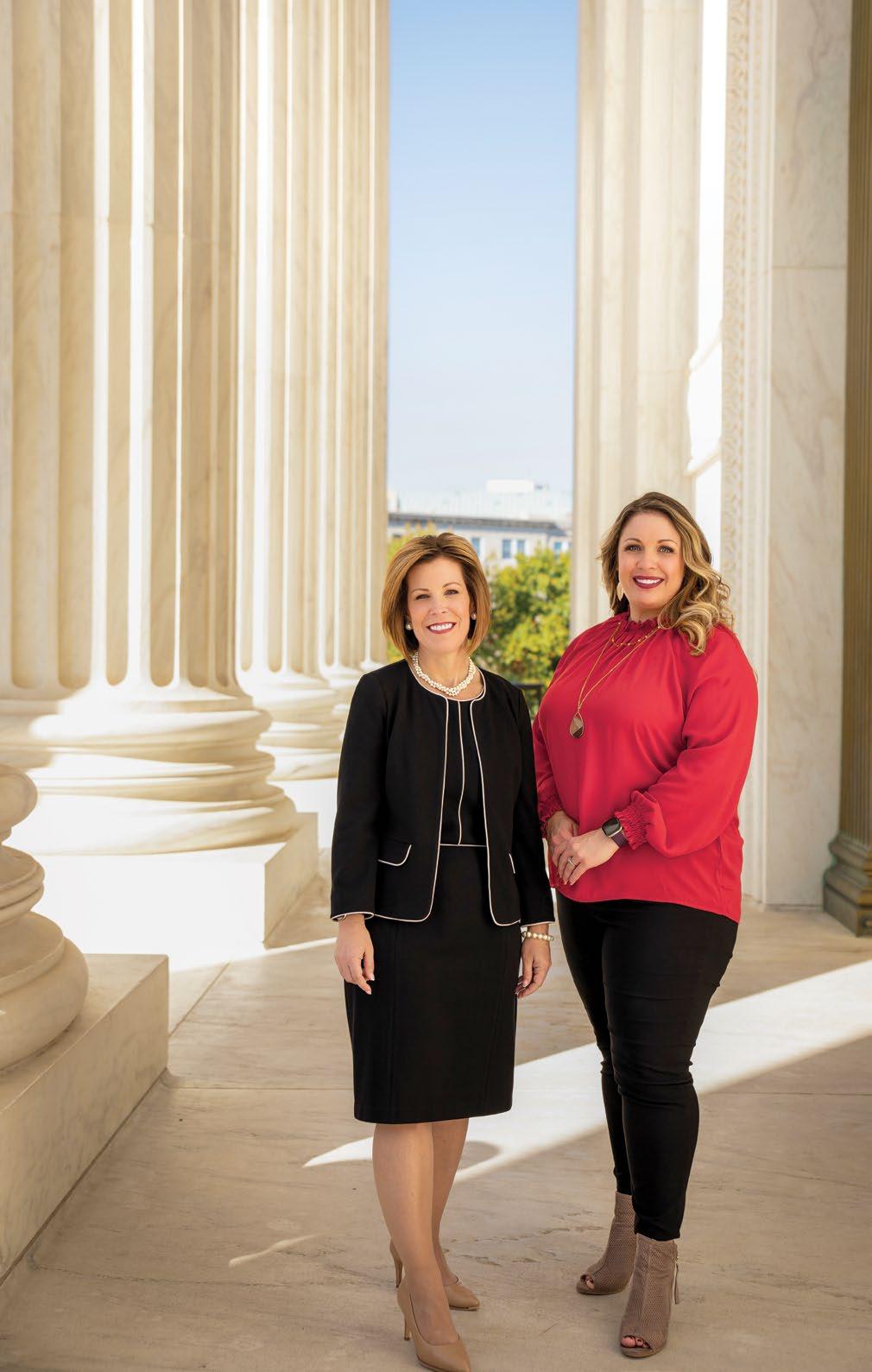
“[A]s this Court has long held, the opportunity to think for ourselves and to express those thoughts freely is among our most cherished liberties and part of what keeps our Republic strong.”
U.S. SUPREME COURT IN 303 CREATIVE V. ELENIS
Please visit ADFlegal.org to stay up to date on ADF cases and other news
Icould feel fear and frustration welling up as I sat across from my counselor. “Look at what this case has cost me,” I groaned through tears. Looking me in the eye, she asked the question I couldn’t allow myself to consider: “Why not stop?”
I’ve endured a fair share of difficulties through the years. As a teen, my home life was shaken when step siblings became part of my family, and I went from being the oldest child to a middle child. Years later, after I’d married my high school sweetheart, my husband and I looked forward to raising children — but for an excruciatingly long time, we battled infertility. My first two pregnancies were very difficult.
But the joy of eventually welcoming three boys and seeing my own family grow to love the Lord have been worth all of my struggles.
By Lindsey Barr AdamWe live in Richmond Hill, Georgia, not far from Savannah. Growing up, I believed as many Southerners did: that church is something you “do” on Sunday, while every other day of the week you live and look like the rest of the world. For most of my life, religion felt more like a cultural expectation than a relationship. But as my husband and I grew more committed to each other and to our family, we knew that faith needed to be a more central part of our lives.
As the first step in this journey, I joined an in-depth Bible study put on by the church we were attending at the time. The more I spent time in God’s Word, the more I learned about myself. I saw how short I had fallen from His standard, but more importantly, how His grace and mercy surpass all of my failings. Recognizing my brokenness and my need for a Savior brought me into a genuine relationship with Jesus Christ that affected not only my life but also my family’s.
As my husband and I became more intentional about raising our boys with biblical values, I began noticing shifts in our culture, notably in the public school system.

I’d been a full-time public school teacher for 10 years before becoming a full-time mom to focus on raising my young sons. Four years later, I returned as a substitute teacher at the elementary school my two youngest boys attended. I loved teaching and was excited about returning to the classroom. But I was surprised to see that small pockets of radical ideology had crept into the school during my absence.
I kept my observations to myself at first, quietly noting posters and books with hostile messages telling kids to feel shame — ashamed of their upbringing, ashamed of their country, ashamed of the color of their skin. Finally, at the beginning of the 2022-23 school year, I voiced my concerns.
As news of my case gained traction, so did the attacks against my family.
Lindsey Barr
Our school’s librarian had announced a program in which she would read a picture book called All Are Welcome to all the children in the school, including those in pre-kindergarten. In it, I was alarmed to see colorful illustrations of same-sex couples parenting and expecting children — pictures that went against my religious beliefs on sensitive topics my husband and I wanted to address with our boys at the appropriate time.
I expressed my concerns about the book to my boys’ teachers and the school principal and asked for my children to be excluded from the reading program. At first, the school agreed. But the next day, I discovered I’d been locked out of the school portal I used to pick up substitute-teaching assignments.
Later, the school’s human resources department confirmed my worst fear: I’d been fired. Because of my concerns about the picture book, I was considered too extreme to be a substitute teacher at my own children’s school.
A new Georgia law, the Parents’ Bill of Rights, recognizes parents’ fundamental right to direct the upbringing and education of their children. The law requires school districts to develop procedures for parents to object to instructional materials in their children’s classes. Yet school officials targeted me because of the views I expressed as a parent.
I didn’t know what to do at first. But as word about my situation got out, a friend connected me with a local attorney who told me about Alliance Defending Freedom. ADF attorneys helped me file a legal complaint against the school district, arguing that my termination was in direct violation of the U.S. Constitution. The case drew immediate attention. Suddenly, my name was all over the news, from local papers to national news broadcasts.
As news of my case gained traction, so did the attacks against my family. Some people in our community, and even some family members, wanted nothing to do with us. We came home to vandalism, woke up to slashed tires, and faced death threats.
With all the bumps and bruises I’d endured in my life, this was by far the hardest trial I had ever walked through. But when my counselor rhetorically brought up the idea of stopping, I knew I could not. As I’ve grown in my relationship with Jesus, I’ve learned that to whom much is given, much is required.
I like this quote: “You have enemies? Good. That means you’ve stood up for something, sometime in your life.” God was asking me to stand up for biblical truth, and I knew I had to be faithful.
My case was settled in the spring. The school and district officials agreed to reinstate me as a substitute teacher, paid $181,000 in damages and attorneys’ fees, and publicly expressed regret for the pain we had suffered.
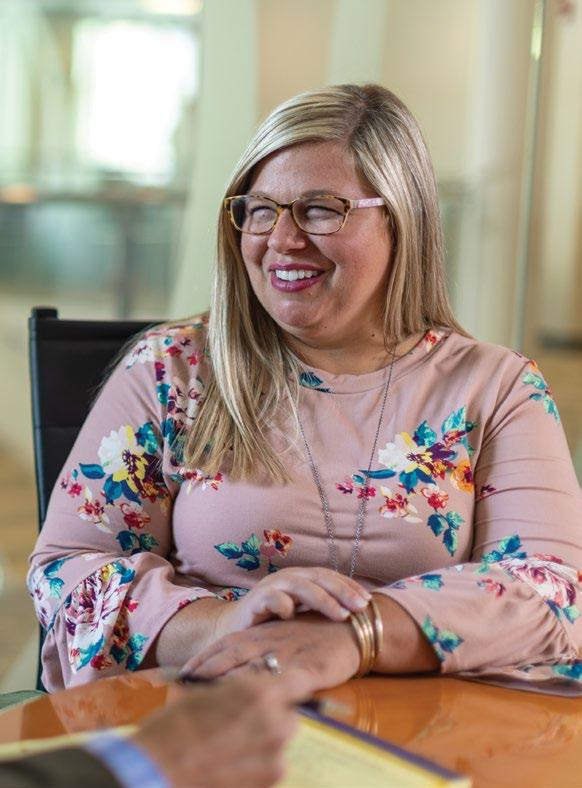
While that chapter is over, I know that God will continue to call me to stand up for truth, wherever I am. If my boys saw me lay down and compromise on the values I want them to learn, what kind of lesson would they take from that?
I look at my sons today and know the fight is worth it. Our future depends on our right to direct the care and upbringing of our children.
As I’ve grown in my relationship with Jesus, I’ve learned that to whom much is given, much is required.
Lindsey Barr
Imagine your next interaction with a bank teller.
You’re there to make a deposit, but a question from the teller catches you off guard: “Before we complete your transaction, we just need you to fill out this brief questionnaire. Just explain the criteria you use to vote in elections, and we’ll get this all wrapped up.”
You’d be shocked, and rightly so. Will the bank only grant you access to your own account if you plan to vote consistent with the bank’s preferences?
That may sound far-fetched, but it’s eerily similar to how JPMorgan Chase has treated the National Committee for Religious Freedom (NCRF) over the past year. Led by former U.S. Ambassador Sam Brownback, the NCRF exists to defend “religious freedom equally for all Americans and all their religious communities.”
Despite the established credibility of the NCRF, the nation’s largest bank canceled the nonprofit’s newly created checking account without notice earlier this year. Why? At first, no one at the bank could say.

After weeks of stonewalling, Chase finally said it would consider reopening the account if the NCRF took three actions: 1) disclosed a list of donors who contributed 10% or more of its operating budget,
2) handed over a list of political candidates the NCRF intended to support, and
3) divulged the criteria it uses to decide who to support politically.
Respecting the privacy of its donors, the NCRF declined the offer.
Debanking clients to serve narrow ideological goals is a growing problem in our politically obsessed cancel culture. Fidelity Charitable has taken similar actions against Alliance Defending Freedom and its Ministry Friends. The financial giant and donor-advised fund manager distributed $10.3 billion in 2021 but is placing obstacles in the way of their account holders’ giving to ADF.
Fidelity has told numerous donors that they cannot give to ADF unless they relinquish their anonymity — often a deterrent to giving — because it has to “ensure that grants are used exclusively for proper charitable purposes” (quoting an email sent to several donors).
Sadly, Fidelity Charitable appears to be caving to demands from far-left advocacy groups. These activists
Debanking clients to serve narrow ideological goals is a growing problem in our politically obsessed cancel culture. ‘‘
Jay Hobbs
are pressuring Fidelity to disclose contributions to specific mainly conservative organizations, including ADF, Family Research Council, and Turning Point USA. Because of our work defending religious freedom and free speech, ADF is frequently the target of activist debanking campaigns like this one.
At this year’s annual shareholder meeting, nationally recognized financial advisor David Bahnsen — who serves on ADF’s Viewpoint Diversity Score advisory council — filed a resolution highlighting Chase’s low score and calling upon leadership to investigate what happened with the NCRF’s account.

Chase asked the Securities and Exchange Commission (SEC) to exclude the proposal from its proxy ballot, but Bahnsen worked with ADF attorneys to convince the SEC to rule against Chase and allow him to present the proposal. That’s a major victory, which forced a muchneeded conversation onto Chase’s doorstep.

This pattern of debanking cannot continue unchallenged. Our nation’s founders understood that the primary function of government is to protect God-given, pre-political rights. That means threats to life, liberty, and the pursuit of happiness don’t need to come from the government to cause real harm.
Thankfully, opposition to ideologically charged debanking is picking up steam. Over the past year, 19 state attorneys general, 14 state treasurers, and nearly 60 financial professionals have called upon Chase CEO Jamie Dimon to provide a detailed explanation of his company’s actions and to correct course by adopting policies recommended by ADF’s Viewpoint Diversity Score Business Index.
Launched in 2022, the Business Index evaluates companies based on 42 questions that measure their respect for speech and religious freedom. Not surprisingly, Chase tallied a mere 9% out of a possible 100% on the 2023 Business Index.
Unless powerful financial institutions like Chase and Fidelity correct course on their own, it may fall to lawmakers to deal with the growing threat to individual liberties they pose.
Large national banks receive significant government benefits, including greater lending power, FDIC insurance rates, subsidies, and bailouts. The fact that those benefits are courtesy of the government and taxpayers obligates banks not to discriminate based on viewpoints. The risk of losing those benefits should motivate financial institutions to distance themselves from cancel culture.
At this fractured time in our national history, business leaders have a vital role to play — especially those in executive positions at banks and other financial institutions. ADF is spearheading efforts to meaningfully engage these leaders to step up and to use their considerable influence to reject debanking once and for all.
Hobbs serves as strategic campaigns and initiatives director at Alliance Defending Freedom.ADF is frequently the target of activist debanking campaigns.
FIND
OUT
